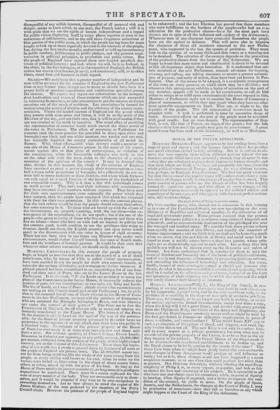ISIORAL OF THE FRENCH REVOLUTION.
MORNING He ['Ann—France appears to be fiist settling down into a state of quiet and repose ; and the intense interest which her peculiar and novel situation excited is daily subsiding. But it is curious to oh- serve the very opposite views which different persons take of the mo- mentous events which have last occurred ; though they all agree in this —that they are calculated to give tu fresh impetus to human thought, and that their effects are likely to ho long and powerfully felt throughout the whole political structure of Earepe, though, for very obvious reasons, less, perhaps, in England, than elsewhere. We find one party contend- big that the success of the popular cause will produce everywhere a rest- less desire of change, totally destructive to all regular Government. This party consists of persons who are the friends of what has been happily termed repressive system, and who object to every change, on the ground that it must necessarily be opposed to the collected wisdom .and experience of finmer ages, and who optical.; with the most perfect serious- ness, still to acknowledge, The riLbt divine of Kings to govern wrong.
We have another party, who, though not so numerous in this country as in some of the Continental States, are now speculating on the esta- blishment of Republics and universal equality, to the subversion of regal and aristocratic power. These persons contend that the present system of European politics is a monstrous composition of kingcraft and priestcraft, and an unwarrantable domination of the privileged few over the wronged and insulted many. We consider both these parties to have been equally the enemies of true liberty, and equally the retarders of human improvement ; and we think that we shall not be hazarding much when we assert, that the real friends of liberty and social order will be found to steer a middle course between these two parties, whose prin- ciples are so diametrically opposed to each other. Let us hope that this useful lesson will not be thrown away on the Monarchs and rulers of Europe. Let them understand that it remains for them to take the cause of freedom and humanity out of the hands of political enthusiasts, and of needy and desperate adventurers, by promoting judicious reforms, and extending the influence of knowledge and education. Let them, finally, instead of endeavouring, to compel a slavish and insecure obe- dience, do what is far easier—establish a constitutional authority, which shall be fietntled on the affections and good sense, instead of on the fears and ignorance, of their subjects ; mid in which the rulers and the ruled. may easily discover their identity of interests.
Momerxn Anonenosim—Philip I., the King of the French, is pro- ceeding, if we may judge from the reports sent forth in such abundance by his supporters, tst grand train, and in the true republican style, to the abolition of everything in the shape of monopoly or et:elusive pric There me, for example, to be no longer any lords in waiting, as under the anc;enl regiew—no formal introductions, except four times a year, when the King will hold a great Court, and receive with every possible form the Diplomatic Body, the Chiefs of the Army and 'Magistracy. the Peers and the Deputies—no ceremony except such as might be used by the first gentleman in France—no ridiculous requirements in point of dress, vestibules, and ante-chambers! What would Louis XIV. say to such a profanation of his system of tinsel, and frippery, and mock dig- nity. ?—But this is not all. The new King is not only to conduct him. self in every respect as a private gentleman ; but even what may be considered the private property of the Crown, is to be as free as the air they breathe to his subjects. The Grand Master of the Stag-hounds is to be dismissed—the stag-hound establishment to be broken up, and the Royal chases to be let by auction for the benefit of the state ! The times have been when we might have justly feared that such extraordi- nary changes in Court demeanour would produce an evil influence at home ; but as it is, these changes could not have happened at a more auspicious moment, or at one when they could produce less effect than at present. Our Gracious Sovereign, without affecting the republican simplicity of Philip I. is, in every respect, as popular, and bids as fair to attract the love and veneration of his subjects. He is accessible to all who have any just claims upon his attention ; while, in point of dignity in bearing, when dignity is required, and a desire to improve the con- dition of the country, he yields to none. On the people of Spain, Austria, and the Netherlands, the changes at the Court of Philip I. may be productive of uneasiness—here they fall as harznless as any which might happen at the Court of the King of the Ashantees.


























 Previous page
Previous page